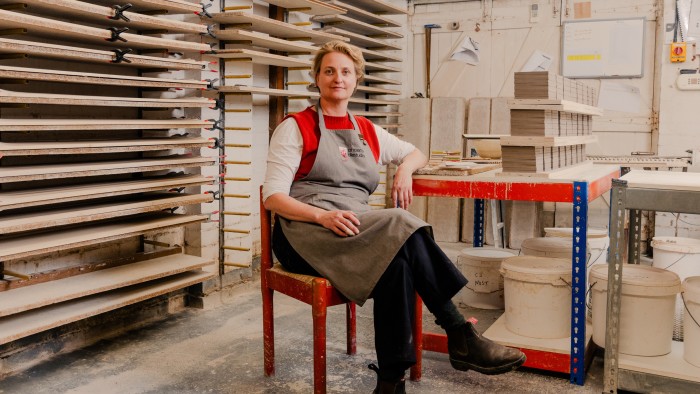‘My plan to save the Potteries – one tile at a time’

Over the judder and buzz of a clay-extruding machine, Sarah Watson and her business partner Paul Gibson are giving me a tour of their factory, Phoenix Tile Studio. Located in an industrial area of Newcastle-under- Lyme – the West Midlands town that neighbours the city of Stoke-on-Trent – “it’s not beautiful by any means”, warns Watson, the founder of bathware brand Balineum. It has none of the historic red-brick charm that can be found elsewhere in the ceramics industry’s once booming heartland. There’s no canal-side bottle kiln. No archive of 19th-century designs.

Yet inside this small and unassuming building, two born and bred Potteries lads (Gibson and a third partner Geoff Shaw, friends since their teens) and one Aussie transplant (Watson) are preserving the area’s rich tile-making heritage in gloriously glossy fashion. Their wares line the loos of London’s recently revamped Tramp nightclub and the odd tech billionaire’s swimming pool. “Phoenix is, we believe, the last tile maker in the UK producing extruded, hand-cut tiles at any scale,” says Watson, “and the last tile maker in the UK who specialises in tubeline decoration.”
The tubelining technique – which involves piping thin lines of clay onto a surface to be filled in with glaze – has become a USP of Balineum, which Watson founded in 2007 when she moved to London and couldn’t find a chic shower curtain. Named after the Latin word for bathhouse, its catalogue of products now ranges from wiggly-edged mirrors to loo-roll holders and towel rails, but roughly 65 per cent of the business is tiles. In 2014, Balineum purchased around £10,000-worth of tiles from Phoenix; last year, it was £330,000. “We’ve just grown together over the past 11 years,” says Watson.

Last October, in fact, Balineum took over ownership of Phoenix: Watson was looking to expand, while Shaw and Gibson, both turning 60 next year, were starting to think about “winding down”. “Their plan was to shut the doors and walk away in five years’ time,” says Watson. “I didn’t want to lose my number-one product but I also didn’t want to lose this skill set. We’re now one of only three tile-makers left in Stoke – the others being HE Smith and Craven Dunnill Jackfield – and I didn’t want it to die.”
The Potteries industry first developed around local clay and coal supplies in the mid-17th century. By 1800 the area was the global centre of pottery production, its skyline dotted with some 4,000 bottle kilns, and employing 70,000 people. Manufacturers such as Wedgwood, Royal Doulton and Spode remain well known, but local production has continued to decline and in many cases it has ceased entirely. In terms of tiles, one such is Minton, Hollins & Co, whose 1800s encaustic designs can be found from the Palace of Westminster to Washington DC’s Capitol Building. Another is Johnson Tiles, founded in Stoke-on-Trent in 1901; earlier this year it closed its factory in the city. “At one time Johnson had more than 3,000 employees,” says Watson. “Today most tiles sold in the UK will be manufactured abroad – increasingly in China, India, Pakistan and Turkey.”


The trajectory of boom and bust is all too well known in Stoke. Gibson and Shaw started Phoenix when they were made redundant from a firm named Art Tile in 1991. “Receivers were coming in, emptying the place, filling up skips,” recalls Gibson. Taking up the offer of “300 quid for the dipping line, the kiln, some tables and other bits and bobs”, the two men set out on their own. While a phoenix emerging from the ashes was the idea behind the name, their first premises were more “pigeon-infested”, laughs Gibson. “We had plastic on the ceiling to keep the rain out, no heating or anything,” adds Debra Jones, one of Phoenix’s most experienced tile decorators.
The tile-making process begins with earthenware clay – “fed through an extruder to become long strips and left to dry overnight”, says Gibson. These are then hand-cut into individual tiles before being dried and fired. A layer of engobe (a water-clay mix acting as an undercoat) is applied before they are ready for painting, tubelining or glazing.


The decoration team works across Balineum’s core collections, from graphic, vibrant patterns to French artist Louis Barthélemy’s Egypt-inspired illustrations, as well as bespoke commissions. While one client, an art collector from Germany, wanted a leafy wallpaper design translated into tubelined tiles, a bespoke mural for a London kitchen by interior designer Sophie Ashby featured wildflower illustrations by Anna Glover. The draw, says interior designer Pierre Yovanovitch, who recently commissioned bespoke Balineum tiles for a private residential project, is “a handmade feeling that brings a space to life”.
But it’s a difficult time to be a manufacturing business. In June, Stoke-based ceramics success story Emma Bridgewater, founded in 1984 and based in a Victorian factory in Hanley, reported a near £1.4mn loss, credited partly to mounting production costs. Phoenix too has felt the pinch: “Our energy bills doubled, our rent tripled, minimum wage went up 10 per cent, but we also gave people pay rises and cost of materials has gone up 30-plus per cent,” says Watson. She’s not shy in announcing that in her first year of ownership Phoenix lost £100,000. “Am I fighting a tsunami of changing economics that no one – not I, nor anyone else – can withstand?” she ponders. “Variations of both ‘Let’s do this, Duck’ and ‘God, I hope I don’t fuck this up’ sit with me almost permanently.”


A communal fighting spirit prevails in the 12-strong team, but also beyond it. On the day that I visit, Phoenix is taking part in a sports day with 1882 Ltd, the local, design-forward ceramics brand formed in 2011 by fifth-generation potter Emily Johnson and her father. Watson has also opened up discussions with other potteries using traditional techniques, from Emma Bridgewater to American outfit Pratt + Larson, based in Oregon. “There are now so few of us left on the dancefloor, it’s in all of our interests to help preserve each other,” she says. “The more people making tiles and working in ceramics, the better it is for everyone.”

In July, Stoke-on-Trent was awarded World Craft City status by the World Crafts Council, an international non-profit organisation “dedicated to fostering the preservation, promotion and advancement of global craftsmanship and traditional crafts”. For Paul Williams, board member of arts and culture initiative Stoke Creates, one of the main aims of the designation is to “make sure that the city’s traditional skills are passed on through generations, to preserve and promote not just our craft heritage, but also the future of our crafts”. Next year, the centenary of Stoke-on-Trent gaining city status will be a further cause for celebration. Plans are in progress to host the world’s biggest tea party, using all locally made pottery, explains Nicky Twemlow, co-founder of philanthropy network Made in Stoke.
“Ceramics in the city is having a bit of a rebirth,” says Shaw. “We’ve seen it crash and all the big companies move out, but tiny designers are now making headway. And together they are all making a big difference.”
balineum.co.uk. phoenixtilestudio.co.uk. madeinstoke.com. stokecreates.org.uk
#plan #save #Potteries #tile #time








